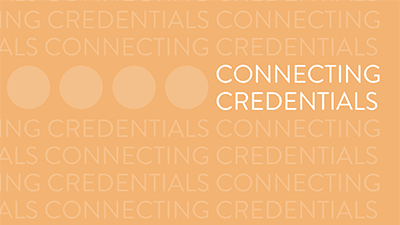INDIANAPOLIS–The U.S. has many types of credentials representing postsecondary completion, but students and employers often struggle to understand what these credentials mean, how they’re connected and whether they are high quality. To address this challenge, more than 40 business, labor and education groups today launched a national dialogue focused both on understanding the problems created by the current credentialing system and developing solutions to create a more connected, transparent system that better defines credentials in terms of what individuals know and can do.
The credentials dialogue partner groups will meet over the summer to outline potential solutions that will be unveiled during a national summit this fall. To help start the dialogue, Lumina Foundation today released a thought piece, called “Connecting Credentials: A Beta Credentials Framework,” designed to frame the meaning of various credentials in terms of the knowledge and skills that recipients of each credential should have. A new website—connectingcredentials.org—also has been launched to support the national dialogue on credentialing.
“We need to transform today’s fragmented postsecondary landscape into one that is student-centered and learning-based so that the meaning of credentials is clearer to employers and students,” said Jamie Merisotis, president and CEO of Lumina Foundation. “This is critical if we’re to increase access, multiply the benefits of increased attainment, reduce social inequity, ensure educational quality and foster individual success.”
Postsecondary credentials represent a broad array of learning, including skills-based certificates, industry-awarded certifications, degree programs and post-doctoral studies, badges, work-based apprenticeships, and more. The dialogue’s efforts to help students and employers better navigate these myriad pathways will be critical to our nation’s economic future since 65 percent of jobs will require an education beyond high school by 2020.
“Without a postsecondary education, workers’ prospects in the 21st-century economy are increasingly grim,” said Anthony P. Carnevale, Director and Research Professor at the Georgetown University Center on Education and the Workforce. “Providing more Americans with a pathway to obtain a high-quality credential should be an urgent priority for us as a nation. And that requires a system that works better for students, employers and our economy.”
Under the current credentialing system, it’s difficult for individuals to know which postsecondary education or training programs they should pursue to secure their desired job or build the skills needed to remain relevant in today’s workforce. It’s equally challenging for students to know how credentials translate from one job or program to another and which credentials are high quality.
The diffused system also vexes employers, who struggle to understand whether prospective hires are qualified for the jobs they’re seeking to fill, based on the credentials they hold. In a survey of 126 CEOs of major U.S. companies conducted by Business Roundtable and Change the Equation, 97 percent cited the “skills gap” as a problem. “To remain competitive in our global economy, employers must have the talent needed to fill their positions and fuel their industries, and critical to that is knowing who is qualified for today’s jobs,” said former Gov. John Engler, president of Business Roundtable.
The credentials dialogue group will expand leading up to the national summit to which more than 200-plus organizations representing education, employers and industry sector associations, workforce agencies, government, philanthropy, think tanks, and students will be invited. For a full list of dialogue members, please visit connectingcredentials.org/national-dialogue.
Related news:
- When a Degree Is Just the Beginning | Chronicle of Higher Education | September 14, 2015
- Let’s Talk: Lumina Launches a National Dialogue on Credentials | New America Ed Central | June 11, 2015
- Lingua Franca for Credentials | Inside HigherEd | June 12, 2015
- Connecting Credentials to Improve Economic Mobility | CLASP.org | June 12, 2015
- Proliferation of credentials, certificates, licenses and degrees confuses students and employers | Cleveland Plain Dealer | June 12, 2015
